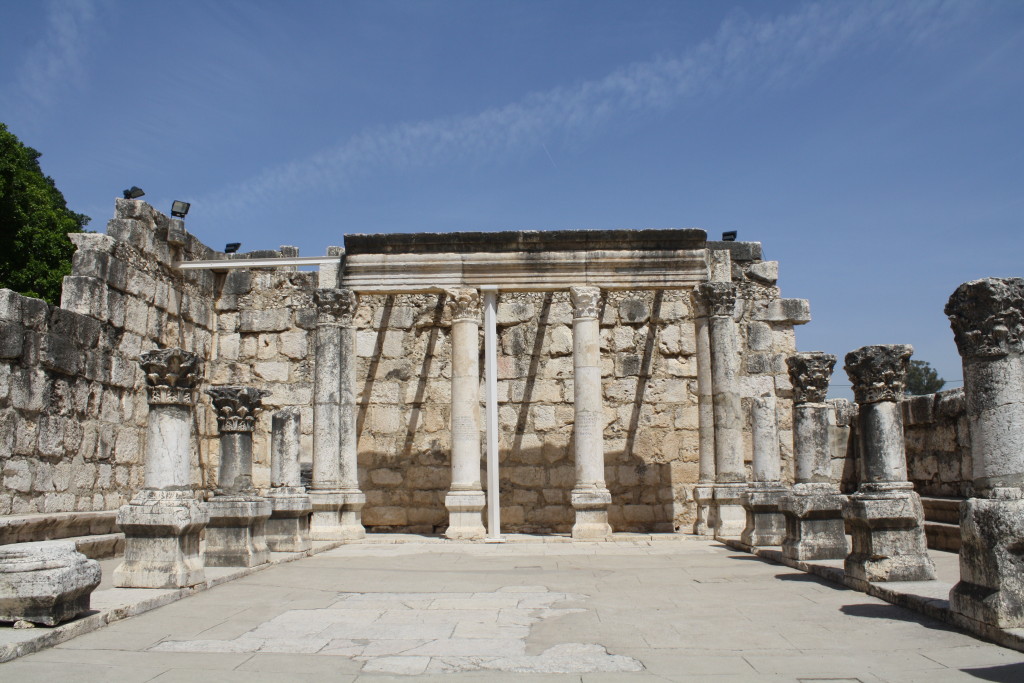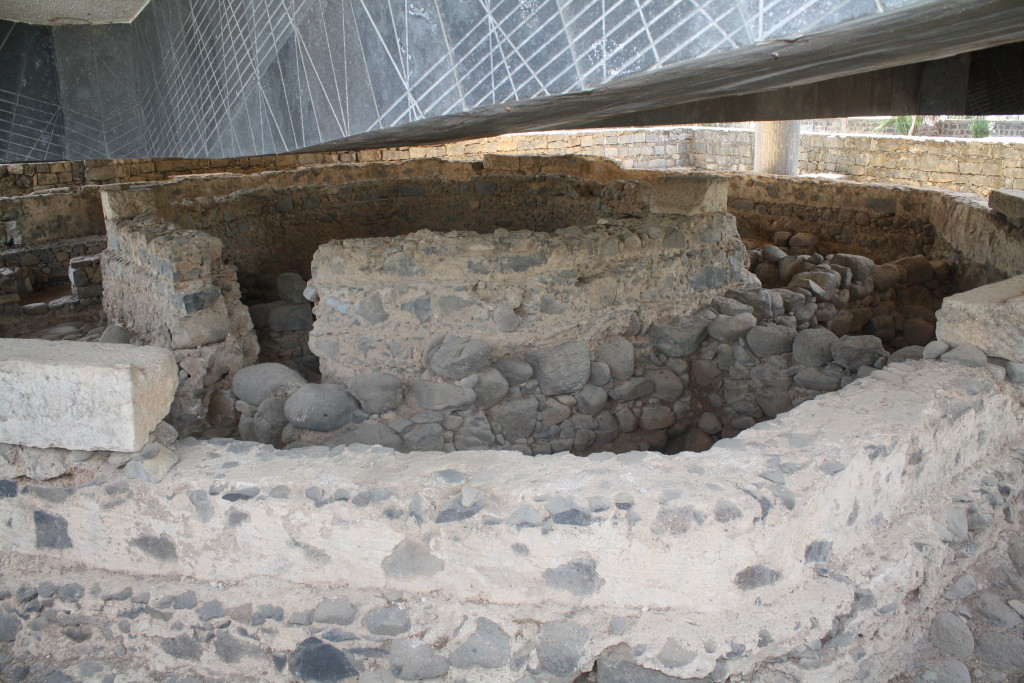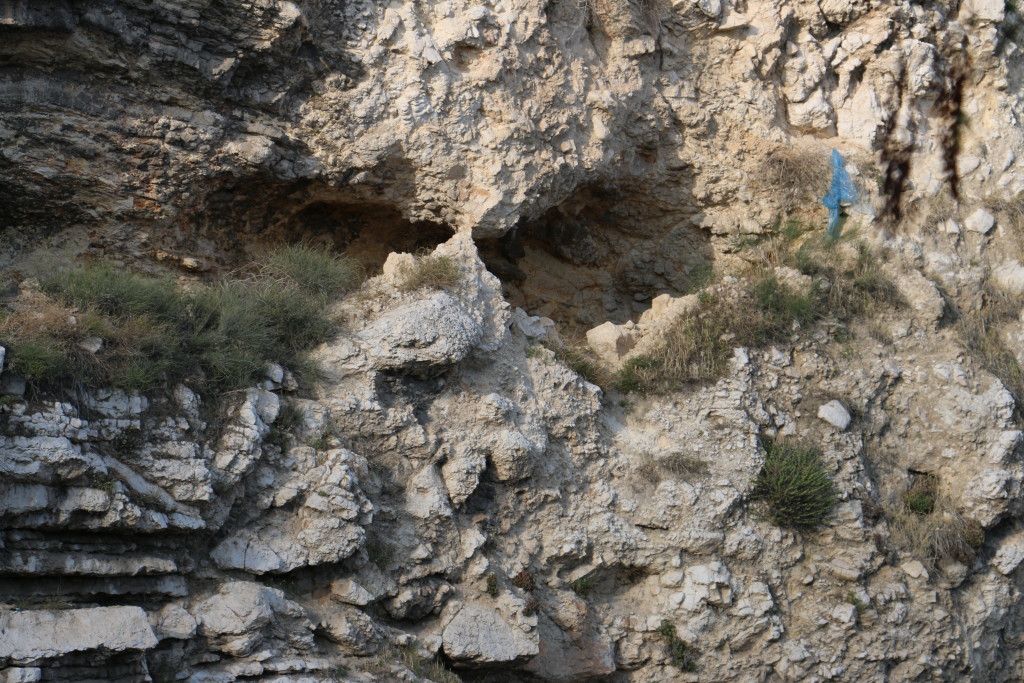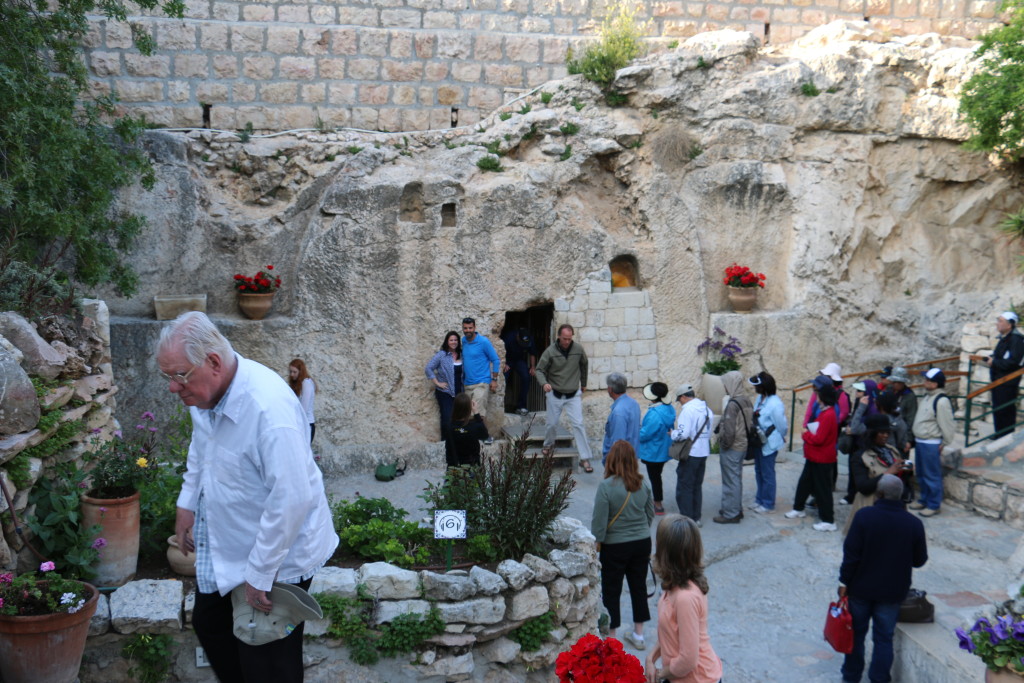Bible Reading Challenge Blog
February 7, 2016: Day 35 – Mark 7
February 7, 2016One of my most vivid memories of going to the Blue Mosque in Istanbul is seeing the dozens of spigots lined up with men washing their hands and their feet in front of the running water from these spigots. In Islam before you enter a Mosque you must be ceremonially clean, your hands and your feet must be presentable to the Lord. There is something powerful about washing yourself before you enter the presence of the Lord. From a Christian perspective there is nothing more sacred about entering a church than there is in entering your home, or entering a story. God is present in all places and in all situations. But that should not remove the urgency and the need for us to be ceremonially, or better yet metaphorically, clean. Going through life with the intent of keeping clean, in the sense that Jesus uses this word here in chapter 7, is a great goal. Look at vs. 20-23 and you use one of the rare times that Jesus actually calls out sin by name. The list that he gives is, unfortunately, contains activities which we commonly include in our daily lives. The goal is to eliminate them from our hearts, and the only way to do that is by asking if all that we want and all that we do is focused on the presence and the desire of the Lord.
We already touched on the Syrophoenician woman. Look at how Jesus heals the deaf and the mute man at the end of this chapter. We don’t see Jesus taking such a hands on approach in healing someone as he does here, except in John 9:6 where he spits in mud and places it on the blind man’s eyes. I like seeing the details in what Jesus actually did in order to heal people. Sure, he could just say the word and the person is healed, which happens in the vast majority of the times. But to actually use the elements at his disposal allows me to think that maybe, just maybe, he needed to get across that God is the great healer in a very practical, hands on kind of way. I like that.
February 6, 2016: Day 34 – Mark 6
February 6, 2016My freshman year in college I started a Bible Study on my floor. It was a very diverse group of people who came to it. My roommate was from Guyana and was Rastafarian, and he attended at first. We had a few evangelical Christians who attended. We had a number of seekers who had never been a part of a Bible study before come and take part. And then there was Andy. Andy was Mormon and absolutely loved to study the Bible. What was fascinating about Andy’s time with us was that he knew that he only had one year at college and then he was going to go off on a mission for two years. I’m not sure if you have ever run into Mormon missionaries but we have seen them everywhere where we have served. In Italy and Russia they always traveled two by two. These verses in chapter 6 remind me of the methodology that the Mormons follow where they are sent out into the world in twos with next to nothing to keep them alive. For all that is wrong with Mormonism, they can still teach us quite a few things.
Today we had our leadership retreat at church and I shared the story of my ordination service. It was moving and a service I will never forget. I was ordained in the Presbyterian Church in Pleasantville, NJ. At the end I got on my knees and all those people who had been significant in my life came up and laid hands on me. A whole group of my college and high school friends actually came to see the service. For most of them it was something very, very foreign to them. I was on a high after the service and they had a reception for me in the fellowship hall of the church. There I was gathered with my friends when one of them said: “Bob, I couldn’t help but think when you were on your knees of that time when grape Jello came out your nose.” Needless to say, it ruined the mood of that spiritual high that I found myself on.
Familiarity breeds contempt and in Jesus’ case, familiarity lead to him not being able to minister to those in his hometown. The Gospel message has become very familiar to us. Do we ever stop and think about what it means when we say that God became one of us? Do we ever stop and think about what it means when we say that God died on the cross to save us from eternal damnation? Do we ever stop and think about how short we fall from Jesus’ commandment to love God and love our neighbor?
For some reason this song just came to my mind…
https://www.youtube.com/watch?v=nPFnHdJ0dl0
We haven’t even talked about John the Baptist on a platter, well, at least his head. Fascinating that John the Baptist is seen as someone who spoke truth to power. What that phrase means is that John the Baptist was not shy to tell Herod that he should never have married his brother’s wife. It wasn’t Herod who wanted him dead, but rather Herodias, the wife. How willing are we to speak truth to power when we know that our lives could be at stake?
Next we have Jesus feeding the 5,000 and Jesus walking on water. Too much in one chapter, but all of it significant.
February 5, 2016: Day 33 – Mark 5
February 5, 2016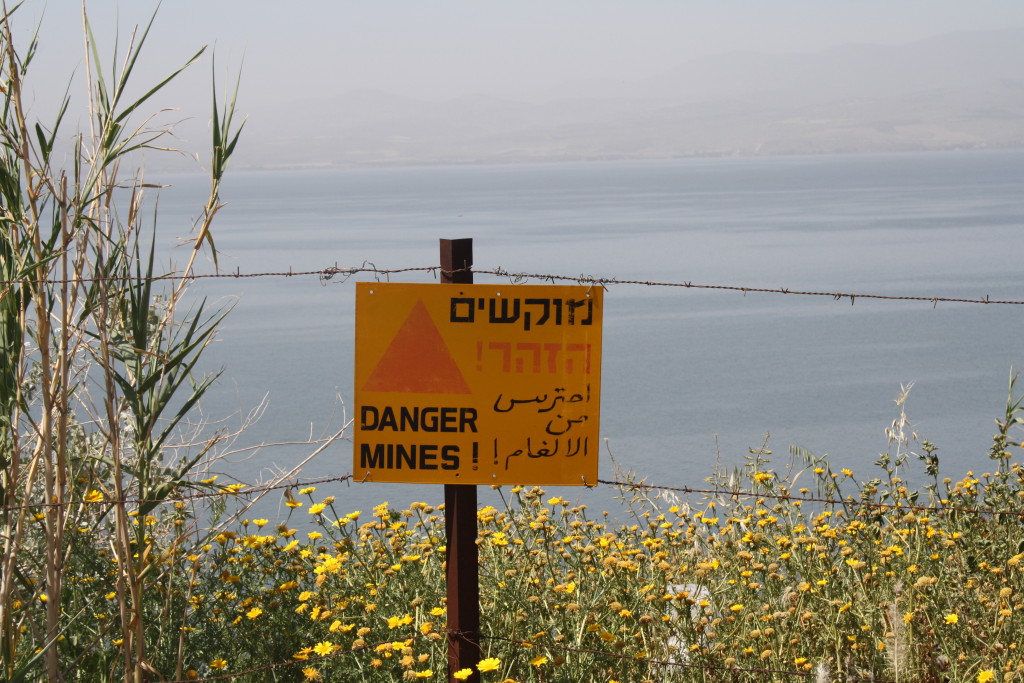
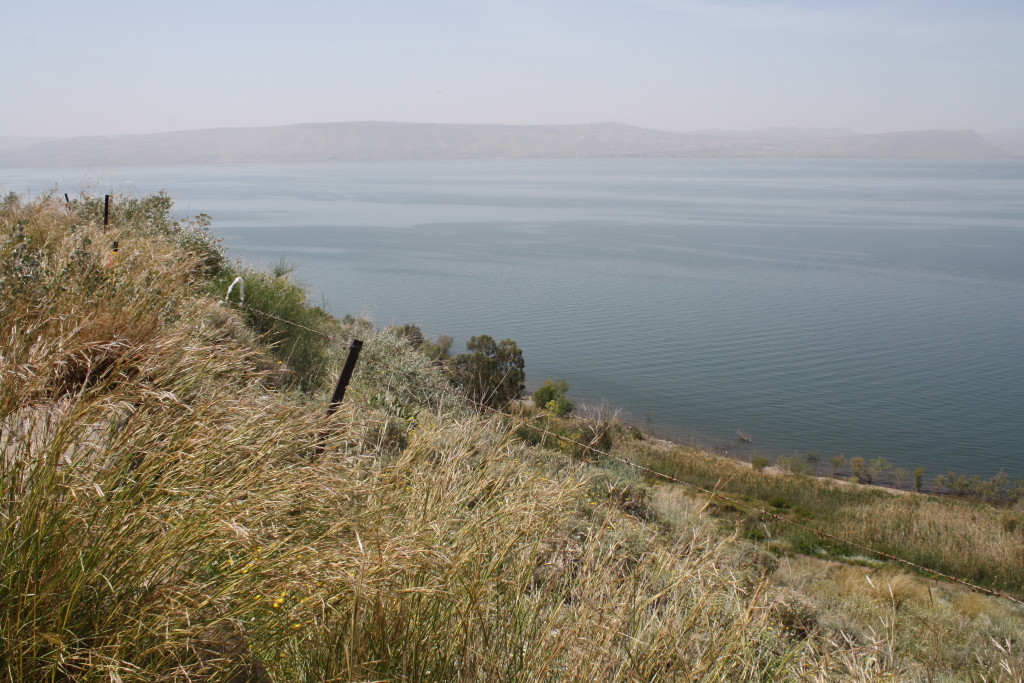 So these pictures represent our best guess as to where Jesus drove out the evil spirits of legion and where they then entered the pigs and and drowned into the sea. For some reason I pictured it happening today with 2000 swine running down a hill full of mines and the carnage that would have ensued. The recognition of who Jesus is by a demoniac living in the tombs is a humbling Bible story considering that he may be one of the very few who truly understand the power and the presence of our Savior. So often it is the least expected person who actually understands and is a follower of Jesus rather than those that we traditionally think are obeying his commandments.
So these pictures represent our best guess as to where Jesus drove out the evil spirits of legion and where they then entered the pigs and and drowned into the sea. For some reason I pictured it happening today with 2000 swine running down a hill full of mines and the carnage that would have ensued. The recognition of who Jesus is by a demoniac living in the tombs is a humbling Bible story considering that he may be one of the very few who truly understand the power and the presence of our Savior. So often it is the least expected person who actually understands and is a follower of Jesus rather than those that we traditionally think are obeying his commandments.
The man who had the evil spirits then asks Jesus to be able to be one of his disciples and to be with Jesus as he ministered. But Jesus had different plans for him, and he becomes one of the first evangelists who was sent out to the Decapolis, or the ten cities within the Palestinian region. It is significant that already the word of Jesus was getting out and that it wasn’t just after his death that people began to understand who he was, but even before.
We also have the woman who was suffering from a hemorrhage for 12 years and could not get any resolution to her problem. That is a long time to have a medical issue that no one can solve. “If I just touch his clothes, I will be made well.” There is no wavering there, there is no doubt expressed by her and the sentence contains no conditional tense in it at all. Jesus’ release of power through his clothes is a bit unusual, not something that we see anywhere else, and we must assume that it was purposeful and for a reason, not just a random act of kindness over which he has not control. Look at vs. 33 and you see that she tells Jesus “the whole truth.” We often miss that part of this story. It is there where we find the reason for the miracle. She needed to tell Jesus the whole truth because it is only after that happens that Jesus is able to say: “go in peace and be healed of your disease.” Often it is our inability to be able to face the truths in our life that keeps us down and often unable to get past whatever may be ailing us. The telling of the truth, to ourselves and our family, is crucial in order to have a healthy relationship with our Savior.
The raising of the dead child is also a very unique miracle that takes place in the ministry of Jesus. I love the fact that upon healing her he orders her family to give her something to eat. Is this a case where Jesus intervenes in a situation where the parents were maybe not taking care of her as she should have been taken care of? We are reading way too much into it, after all her father comes to ask for Jesus to come and heal her. Jairus was a leader in the synagogue. Jesus takes Jairus and his wife and Peter, James and John into the room to raise the girl from her sleep. He takes those who needed to be there to see this little girl be raised from the dead. I can only imagine the mom and dad seeing their little girl rise up after they had marked her off for dead. How do you not tell anyone what Jesus just did for you (vs. 43)?
February 4, 2016: Day 32 – Mark 4
February 4, 2016I have to admit that there are times that I am watching a golf tournament on TV and I see a player get an 8 on a hole and there is something in me that celebrates. “Hey, I can do that!” It is a similar feeling that I get when I read the very last verse of this chapter where after Jesus calms the storm the disciples look to each other and say: “Who then is this, that even the wind and the sea obey him?” Just the fact that the disciples themselves didn’t know exactly who Jesus was or what he was capable of gives me a bit of a peace of mind in those times when I’m unsure of what God’s plans are or in what direction God is leading. If the disciples didn’t understand Jesus and they were living with him, then I guess it is okay to not completely know the will of God in every single situation in my life.
We see once again the parable of the sower and the seed and Jesus explains it explicitly, yet once again, to his disciples in chapter 4 of Mark. If you wanted to compare Matthew and Mark you can do that if you turn to Matthew 13. We find, as we will throughout Mark, that this Gospel writer is much more succinct. What Mark does include, which Matthew doesn’t in association with this parable, is the song: This Little Light of Mine. Okay, Mark doesn’t actually include the song but he does give the basis for that song. Starting at vs. 21 we are told that a light is not to be hid under a bushel. But even more importantly Jesus says that nothing will ever remain hidden.
Just think about those words for a moment. Think of when you arrive in heaven and Jesus replays a movie of your life and your mom is sitting right there next to you. What parts of that movie are you going to squirm and really wish your mom weren’t there? That has always been an intriguing analogy for me. Can we apply this verse to the present? Are we able to say that all will be revealed in our lifetime? I strongly believe that if we continue to do that which God calls us to do, and there are people around us that are somewhat sketchy and not doing that which ought to be done, eventually that will be found out. It provides an inner peace knowing that God knows all and that all will be brought to the light, even in our lifetime.
February 3, 2016: Day 31 – Mark 3
February 3, 2016There are some who say that Jesus’ refusal to follow the traditional approach to the Sabbath made him a target for the religious leaders and ultimately it was what had him killed. It would seem that vs. 6 would support that approach. Jesus also mentions in Matthew 5, if you remember, that he came not to abolish the law, but to fulfill it. These two statements would seem contradictory. Did Jesus think the Sabbath was important or was it another opportunity for him to show that he was Lord over all, including the Sabbath (Mark 2)? The answer lies in the previous chapter where he states in Mark 2:27 that the Sabbath was made for man, and not vice versa. That’s a pretty powerful statement in a culture where on Sunday you only do certain things and you definitely do not do other things. It is a good lesson for us to learn whether we follow something legalistically, like the Pharisees, or if we follow it because it is helpful for us to recognize that the Lord is Lord over all time.
So far we find Jesus is the anonymous healer/prophet/teacher/savior. Already he has told a number of people not to tell others about who he is. He seems to have an aversion of crowds and just wants to carry out the work that he was set on earth to do. He was not sent to earth to heal. He was not even sent to earth to teach. God himself came as one of us so that he could live, die, and be resurrected so that he could save us from our sins. The role model that he was while he was here is a secondary or ancillary benefit from his presence on the earth. This is why we so often find him telling people not to tell others of what he did. He did not want people to be confused in his task on earth. The more he healed the more people would see him as a simple, but effective healer. He was so much more than that. What is he to us today?
That question of who is Jesus to us today comes on the heels of Jesus’ family thinking that “he is out of his mind”. We always do have options in how we view and understand Jesus. He can be someone who was a good teacher, but his claim that he was a Son of God just might cause us to keep him at arm’s length. He can be someone who is God incarnated, but then that will cause some people to think that we are out of our mind because we take this stuff seriously. I was speaking with someone the other day who is surrounded by family members who don’t understand how she can take literally the promises of Jesus. Eternal life and heaven is just something that those who are weak need in order to cope. At that point I encouraged her to find others who loved Jesus and followed him and surround herself with those who would encourage her, and not tear her and her faith down.
In essence that is what Jesus is saying. Who is my family? Whoever does the will of Jesus is my family. That’s a great place to start.
February 2, 2016: Day 30 – Mark 2
February 2, 2016Recently I receive an email where a question was asked if Jesus ever explicitly spelled out to his disciples who he was and the power that he had to forgive sins. Did he make it clear how his death and resurrection were tied up in this new hope that we have in Jesus? These verses and the story of Jesus healing the paralytic contributes to the recognition of who Jesus was. He states very clearly in vs. 10 that “the Son of Man has authority on earth to forgive sins.” This is at the heart of who Jesus is for us, he is God who is able to forgive sins.
When we read about Jesus hanging out with sinners we can see the shaking of the heads of the religious folks as they criticize him for hanging out with the wrong crowd. “Why does he eat with tax collectors and sinner?” While we are absolutely called to be separate and to be different and not to give the impression that anything goes, we are also called to minister to those who do not know Jesus, even if that means placing ourselves in situations where others just might criticize us.
It’s a short blog today, but one where I hope and I pray that you are able to identify with the one whose sins are forgiven, and as a result is given a new life. May we see ourselves as one who is carried by the hands of our loved ones to the feet of Jesus so that we can be healed.
February 1, 2016: Day 29 – Mark 1
February 1, 2016So we turn the page and we find ourselves in the Gospel of Mark. What you see above is a mosaic from St. Peter’s Basilica in Rome at one of the four corners above the altar. It depicts Mark, the Gospel writer, with a lion peeking out from under his book which he is writing. Mark is always seen as a lion, but the reason why is less clear. Some say because of the passage in Revelation 4:7 which describes the four creatures and the first being like a lion.
That takes us to the history of Mark and who wrote it and when it was written. I am of the firm conviction that it was the first Gospel written and it was written by an eye witness account to the life, death, and resurrection of Jesus. While the author is anonymous, although some think it is Mark the evangelist a companion of Peter, it is fairly clear that it was someone who knew Jesus and was present with him in some fashion. The Gospel is written around 35-40AD and describes some current events which only someone who lived through them could have described. So, since Mark is the first Gospel written, then Matthew, and Luke, and John would all have used him as a source for their writing. You will find that Matthew and Luke follow very, very closely to Mark leaving only John as the odd ball out. Matthew, Mark and Luke are called the synoptic Gospels because they have so much of the same material.
It is thought that Mark is writing to a Greek audience because of the pains that he goes to in order to explain some of the Jewish festivals and some of the Scriptures which would have been common knowledge to Jewish readers. When we get to some of them I will point them out. Matthew writes: as it is written, and that assumes that the reader will know where it is written. Mark will say: as the prophet Isaiah stated, just so the reader, who is Greek and not familiar with the Hebrew text, will know what he is talking about. It is thought that he wrote this letter in Rome because he does contain a number of Latin phrases which is a bit unusual. Okay, enough of the background, now to the actual Scripture.
Nothing like hitting the ground running. Mark gets out of the gate right away and jumps right to the introduction of Jesus to the world in his baptism. What you are going to find in Mark is that he follows the KISS philosophy (Keep it Simple Silly). He doesn’t use any extra verses to describe events, and so as a result his is the shortest Gospel. The baptism has none of John’s reticence to baptize Jesus, but rather gets right to the point which is that Jesus is the Father’s beloved. When he is in the wilderness we have no temptations, but rather wild animals who keep him company (I kind of like that side of the story).
Jesus calls his first disciples who were fishermen and they follow him immediately. He tells them that they will become fishers of men. Jesus is portrayed constantly and consistently in Mark as a healer. In fact, he heals Peter’s mother-in-law (no jokes allowed) and spends time with Peter’s family.
The pictures above represent 1) the synagogue in Capernaum where this scene takes place starting in vs. 29 and then 2) the apparent, supposed, maybe house of Peter where he healed his mother-in-law and then she got up and served him. Again, amazing to be in Capernaum, the town where Jesus spent most of his time in his ministry.
Those Scriptures where Jesus goes off by himself to pray always stay with me. In this one the disciples are concerned because there are mobs of people looking for him. But that does not interest Jesus. Isn’t that quite the opposite from church leaders today? We go to where the mobs of people are. For us a successful year is when we get more people than last year. For Jesus, he heals and performs miracles and then tells people not to tell anyone (vs.44) so that he wouldn’t get mobs of people. It consistently seems that we don’t quite get what Jesus is trying to do with church. He is trying to build a community around relationships, not a city based upon numbers.
January 31, 2016: Day 28 – Matthew 28
January 31, 2016You made it! You are done with your first Gospel, and you made it. I’ll never forget when I was a kid and every single Easter after church my father would read the first 10 verses of Matthew 28 as we gathered around the table for lunch. My mom would always have a great spread and whenever he got to the part where it states: “there was a great earthquake”, my three brothers and I would shake that table with all of the food on it as hard as we could. The glimmer in my dad’s eye was captivating, he was so excited to see his kids excited over the resurrection. This would last until one of the legs would give way and we would all scramble to make sure the food wouldn’t fall off the table and we would put the leg back in place. Yeah, missionary families are a bit strange, but we sure had fun together.
Speaking of missionaries, we have in this chapter the great commission. The great commission is when Jesus tells us in verses 16-20 to go and make disciples. These are the verses that have provided the impetus and the motivation for those who would go overseas and risk their lives and sacrifice the benefits and the comforts of home to bring the Gospel of Jesus Christ to those who have not heard. The Great Commission, again these verses in 16-20 are at the center of the desire and the motivation for when my family, Stacy and I and the girls, spent 9 years across the seas teaching and preaching the Gospel. We serve because we are called to teach, to baptize, and to make disciples. It still creates in me a strong burning desire to hit the streets to share the good news.
Over these past few months I’ve been having conversations with some members of the church and there has been a revelatory moment when they said with much enthusiasm: You are a missionary pastor! This explains why you are so interested in the biker boys, why the second service which is supposed to reach those who are unchurched is so important, why the church as a community church is central to my ministry. The Great Commission is not just for the pastor, but for all of us. Each one reach one needs to be a part of our very fabric, it is what Jesus left his disciples at the end of Matthew.
I’m not going to skip the resurrection, don’t worry. But I already mentioned it in the first chapter. Matthew has the women meet Jesus on their way out of the tomb. This is the only Gospel where Jesus is seen, embraced by the women, gives them all a message, and they go on their way. We will be able to compare the other Gospels as we get to them in the future. Let us just say that it is the resurrection which gives our faith its strength. Paul tells us that if Christ is not resurrected then our preaching and our faith is in vain. This Scripture provides us with the strength of the Gospel and the reason why it is so crucial to our faith. Without the resurrection, there is no Gospel. That could go a long way in explaining why the guards felt like it was imperative to cover up the resurrection as a fabrication of the disciples.
January 30, 2016: Day 27 – Matthew 27
January 30, 2016I remember vividly when Mel Gibson’s The Passion of Christ came out. The violence and the blood and the gore was almost overwhelming for me. I really didn’t feel that I needed to see that, although since it came out during Lent it did serve the purpose of setting up one of my sermons. Chapter 27 contains all of the scenes from that movie that were the most disturbing and the most gruesome. You have a Pilate who is very conflicted especially with his wife who is telling him to let Jesus go. Keep in mind that people back then were very wary of the gods coming back in human form so his question: “Are you King of the Jews” is more a question related to are you one of us or are you one of the gods come to rule over us? Because if you are one of the gods I’m not dealing with you. Certainly his wife thought Jesus was one of the gods.
The dramatic washing of his hands and the response from “the people as a whole” that Jesus’ blood would be on them and their children has been used for centuries to point the finger at the people of Israel as “Christ killers”. This phrase has been seen as perpetrating an anti-semitic sentiment that was carried out fully by the Nazis and others in history both before and after WWII. As we mentioned last chapter, who was it that betrayed Jesus? It wasn’t just the mob, it wasn’t just Pilate, it wasn’t just the disciples, it was all of us. Lent is a time that we remember the suffering of Jesus and our complicity, even our daily participation, in his betrayal. The solution is not Judas’ action, but rather what Joseph of Arimathea and the women do at the end. They do not abandon Jesus, even in death, even when things seem completely without hope, but rather stay by his side and tend to the details.
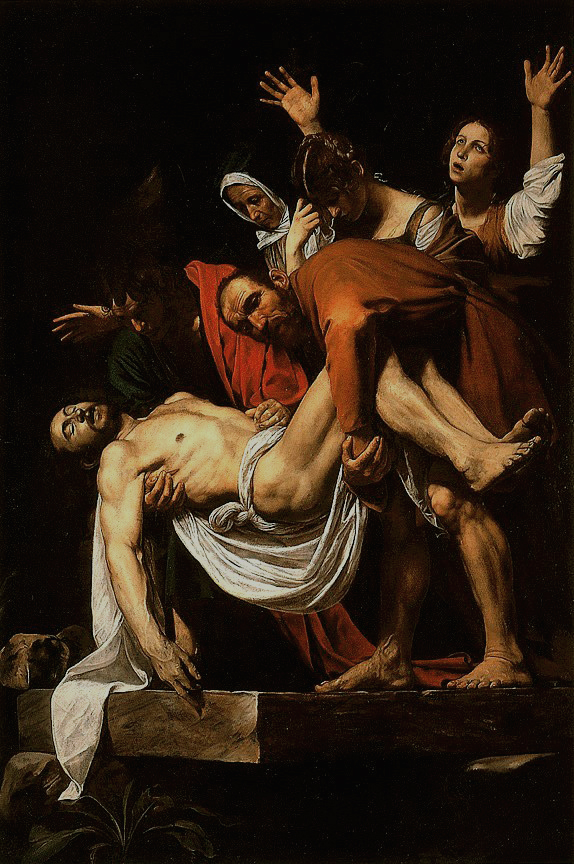 Once again Caravaggio depicts a scene from the Bible that is so alarming that you almost feel as if you are there. You find Joseph and the women taking Christ down and placing him in the tomb. It seem as if they are standing on a cliff and lowering Jesus into an abyss.
Once again Caravaggio depicts a scene from the Bible that is so alarming that you almost feel as if you are there. You find Joseph and the women taking Christ down and placing him in the tomb. It seem as if they are standing on a cliff and lowering Jesus into an abyss.
A trip to the Garden tomb is a must for those who visit Israel. It is so dramatically different from the Church of the Sepulcher where the traditional sight of Jesus’ burial is thought to be. Normally we will have communion together at the Garden tomb and it is powerful to see the opening of the tomb, the face of the skull on Golgotha, and know that this just could be the place where Jesus was laid in the tomb.
That’s probably enough pictures for today, but it truly is a powerful experience to be able to be there and think…this could be the place.
January 29, 2016: Day 26 – Matthew 26
January 29, 2016“The spirit is willing, but the flesh is weak.” Have you heard that phrase before? Did you know that it comes from Matthew 26:41? You do now. It seems that all of a sudden things have become so much more intense than they have up to now in our readings. You have Jesus today on Maundy Thursday with his disciples getting ready for the Passover. But before this takes place don’t lose sight of the first story that is recounted which I believe is one of the most important stories in all of Scripture.
Starting at vs.6 we have Jesus who is prepared for burial by a woman who breaks a jar of costly ointment in order to anoint him and, as Jesus interprets it, prepare him for burial. She was probably just showing how much she loved Jesus, but he took it to mean so much more. The disciples are furious, especially the keeper of the purse, Judas. What a waste of money. Jesus’ response is one that we have to remember and that should be ringing in our ears our entire life as disciples. “You always have the poor with you…”
When you first hear this it might sound like Jesus is not taking too seriously the poor and kind of flinging them aside as if no matter what we do we will always have the poor with us. In fact, he is saying exactly the opposite. He is chastising his disciples for using the poor as an excuse to fill up the coffers of the disciples. They are furious that this money was wasted because they felt like they could have used that money for something else. They use the poor as the public reason for why they were furious, but deep down, they probably just wanted to have a little padding. Jesus’ response is that you do always have the poor with you so you should always have them as a priority and focus upon them as you go through life. Don’t use this one opportunity to bring up the fact of the poor when throughout the rest of your life they really haven’t been a concern to you. Ouch, those are pretty harsh words.
There are times when we will use straw horses to try to prove a point when in reality we don’t care about those horses. Jesus says in regards to the poor, we should always care about the poor, not just when it is to our benefit to care about the poor. It is a great lesson for any time that we feel somewhat self-righteous in judging others for their wasteful lives.
But there is so much more in this chapter, where do we begin? Judas betrays Jesus as a result of this harsh lesson. Judas finally realizes that he is not going to get wealthy by following Jesus. This was not Jesus’ priority for either him or his disciples, but it was a priority for Judas.
We find Jesus at the last supper with his disciples and the whole mystery that surrounds who is the person who is going to betray Jesus. Again, this Scripture has been misinterpreted. His teaching in vs.21 reveals to us what he is trying to tell his disciples. “You all will betray me.” There is not one single person who is the betrayer. We falsely accuse Judas as being the traitor as if he were the only one. Do we forget vs. 56 which tells us: “Then all the disciples deserted him (Jesus) and fled.” It is exactly as he predicted and exactly as Scripture said it would come about. I am getting some great feedback from people on this study. I am so pleased you are following it and enjoying it. One point that was brought up in a conversation is the phrase that Jesus uses often – “for it is written…” and then it is followed by a quote or a statement. Whenever Jesus says “for it is written” he is referring to a Scripture in the OT that was written which directly speaks to what is about to take place. If you look at vs. 31 you will see Jesus quoting Zechariah 13:7, and the disciples would have been familiar with that Scripture.
We find in vs. 26-29 the words that we call the Words of Institution. They are the words that are spoken at the beginning of communion every month. Now I choose to use the Words of Institution that are found in I Corinthins 11:23ff, but some pastors do use these words. We will find these words, or a rendition of them, in Mark and Luke. Only John doesn’t contain them, but we will see in John where we can find them even in that Gospel.
The betrayal scene is legendary. The disciples fall asleep and Jesus three times gives them a chance to redeem themselves. When we went to Israel and to the place that could have been the Garden of Gethsemane right outside of Jerusalem, it was overwhelmingly powerful for me to imagine what it would have been like at night in that garden with Jesus alone. The garden is full of olive trees and terraces and you can imagine Jesus being able to see his disciples and their heads nodding in sleep. How heartbreaking to imagine that your friends, by this time your family, is not able to stay up just a few hours at your request. It was one of the most sobering times in the trip for me as I thought about my life and the times that I chose to pursue my desires instead of staying up for the Savior. A great video that speaks to this concept of overlooking eternity in favor of the present is found here:
https://www.youtube.com/watch?v=jF_x8dsvb_4
We end the chapter with Peter’s denial, which mirrors his not being able to stay awake three times in the garden. All of it powerful, all of it sobering, all of it pointing back to us and the times that we are not able to stay awake in vigilance for the coming of God, all of it reminding us that we have said: “Jesus who?” in various times in our life. The resurrection is coming soon, I can’t wait!

